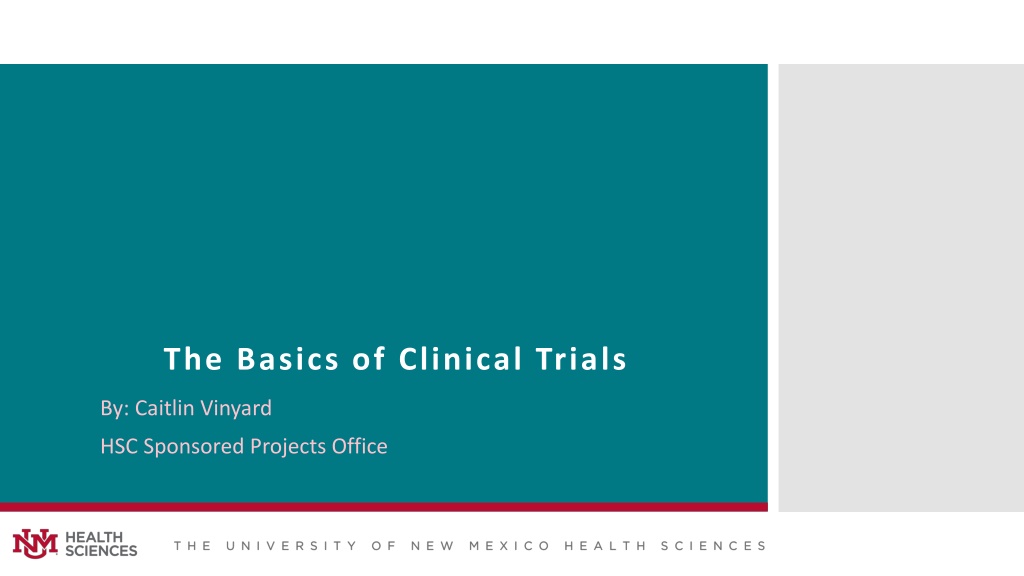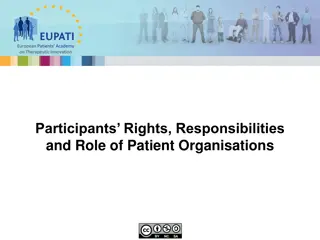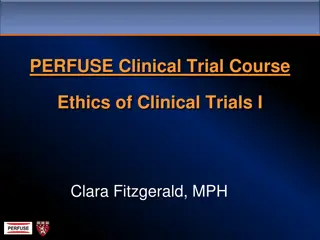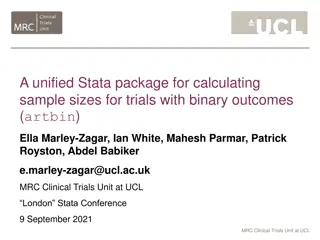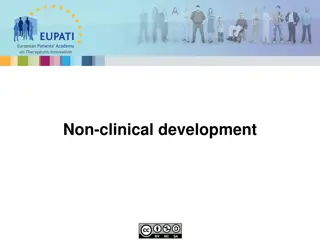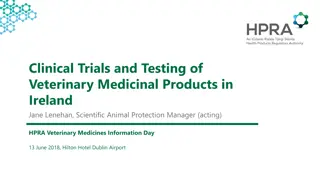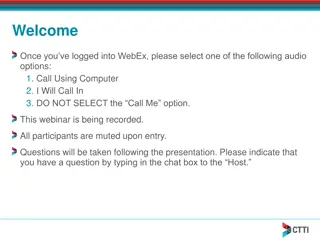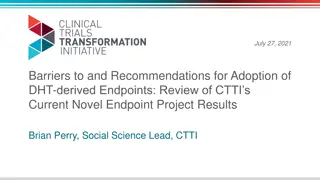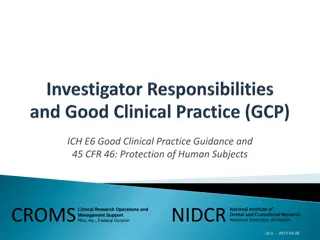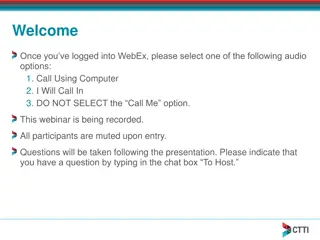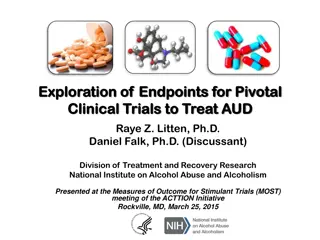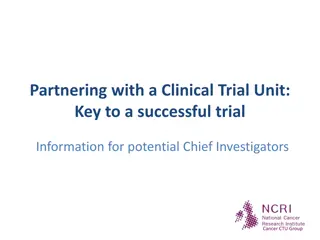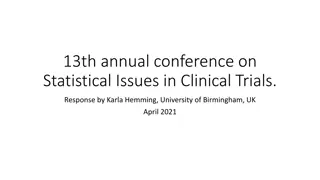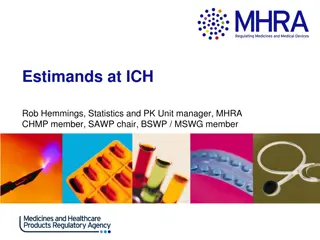Understanding Clinical Trials: Phases, Types, and Definitions
Clinical trials play a crucial role in advancing medical research and treatment options. This comprehensive guide covers the basics of clinical trials, including their definition, phases, types, and key definitions like IND, IDE, NDA, and more. Discover how different phases of trials work, the various types of clinical research studies, and important definitions related to regulatory bodies and practices in the field of clinical trials.
Download Presentation

Please find below an Image/Link to download the presentation.
The content on the website is provided AS IS for your information and personal use only. It may not be sold, licensed, or shared on other websites without obtaining consent from the author. Download presentation by click this link. If you encounter any issues during the download, it is possible that the publisher has removed the file from their server.
E N D
Presentation Transcript
The Basics of Clinical Trials By: Caitlin Vinyard HSC Sponsored Projects Office
What is a Clinical Trial? Clinical trials or Clinical Study are defined in concurrence with NIH and Office of Human Protections (HRPO) guidelines. NIH Definition of a Clinical Trial: A research study in which one or more human subjects are prospectively assigned to one or more interventions (which may include placebo or other control) to evaluate the effects of those interventions on health-related biomedical or behavioral outcomes. Source: https://grants.nih.gov/policy/clinical-trials/definition.htm
Phases of a Clinical Trial Clinical trials are conducted in a series of steps called phases. Each phase has a different purpose and helps researchers answer different questions. Phase I trials: Researchers test a drug, treatment or device in a small group of people (20 80) for the first time. The purpose is to study the drug or treatment to learn about safety and identify side effects. Phase II trials: The new drug treatment, or device is given to a larger group of people (100 300) to determine its effectiveness and to further study its safety. Phase III trials: The new drug, treatment or device is given to large groups of people (1,000 3,000) to confirm its effectiveness, monitor side effects, compare it with standard or similar treatments, and collect information that will allow the new drug or treatment to be used safely. Phase IV trials: After a drug is approved by the FDA and made available to the public, researchers track its safety in the general population, seeking more information about a drug or treatment s benefits, and optimal use. Source: https://www.nih.gov/health-information/nih-clinical-research-trials-you/basics
Types of Clinical Trials Diagnostic trials determine better tests or procedures for diagnosing a particular disease or condition. Natural history studies provide valuable information about how disease and health progress. Prevention trials look for better ways to prevent a disease in people who have never had the disease or to prevent the disease from returning. Quality of life trials (or supportive/compassionate care trials) explore and measure ways to improve the comfort and quality of life of people with a chronic illness. Screening trials test the best way to detect certain diseases or health conditions. Treatment trials test new treatments, new combinations of drugs, or new approaches to surgery or radiation therapy.
Definitions IND: Investigational New Drug (Application) IDE: Investigational Device Exemption NDA: New Drug Application (for sale and marketing) IRB: Institutional Review Board the Ethics Board FDA: Food and Drug Administration EMA: European Medicines Agency MHRA: Medicines and Healthcare products Regulatory Agency (UK) GCP: Good Clinical Practice GMP: Good Manufacturing Practice (drug manufacturing) CDA/NDA- Confidentiality Disclosure Agreement aka Non- Disclosure Agreement
Definitions Principal Investigator/Investigator: individual who conducts the study Site: where the study is taking place Sponsor ($): provides financial support for the study but does not conduct the research. the IND holder; responsible party to the FDA IIT: Investigator Initiated Trial CRO: Contract Research Organization the middle man between Sponsors and the Sites/Investigators Data Safety Monitoring Board: independent group of experts monitoring conduct of trial (patient safety and efficacy) CTA: Clinical Trial Agreement AAHRPP: Association for the Accreditation of Human Research Protection Programs, Inc.
Funding of Clinical Trials Industry-Sponsored Industry developed protocol. Investigators/institutions may propose a protocol to industry. This would be an IIT funded by industry. Unfunded or Internally funded Investigator-Initiated Trials (IITs) are often funded internally Grant-funded Government (NIH, for example) Foundation For-profit
The Elements of (Industry) Clinical Trials Clinical Trial Agreement (contract) Budget Protocol Informed Consent Form IRB Approval Any other documents/approvals that may be required in order to proceed (e.g., conflict of interest documentation, IT Security Review, Privacy Office Review, Legal Department Review)
Submission to SPO In order for the Sponsored Projects Office to begin negotiations on a Clinical Trial Agreement, the department/ PI will need to initiate the review process by creating a CLICK ERA (http://era.health.unm.edu) record, obtain departmental approval through your designated approver, and submit to SPO for review. If you do not have access to Click ERA, please email HSCPreAward@salud.unm.edu to request access. Be sure to upload the draft CTA, budget (draft or final), protocol and any other documents prudent to the study (i.e. payment terms, Letter of Indemnification, etc.), ICF. This will help negotiations begin quicker.
Clinical Trial Agreement (CTA) The Clinical Trial Agreement (CTA) is the contractual arrangement between the Sponsor and our Institution. Below are a list of the most important contract provisions we look for in the CTA. Depending on the complexity of the terms, HSC-OUC (legal) may have to review the agreement prior to it being sent to the Sponsor. Intellectual Property Indemnification Subject Injury Confidentiality Publication Data Ownership Audits and Inspections Record Retention Governing Law AAHRPP
Budget Negotiations The Sponsored Projects Office (SPO) DOES NOT handle the negotiation of the budget for a Clinical Trial. This is done by the PI or whomever the PI designates to negotiate directly with the Sponsor/CRO. SPO does not have the in-depth clinical knowledge to accurately represent what the PI needs or if the associated costs proposed by the Sponsor are adequate to perform the study. As a note, the budget and CTA can be negotiated in conjunction with each other.
Budget Review Below describes the main costs associated with clinical trials and what must be included. IRB Fees - Should budget for the following: New Study Review: $2,500 Continuing Review: $1,000 Modification: $500 Please refer to: https://hsc.unm.edu/research/compliance/hrpo/investigators.html for additional information on how these fees are invoiced from IRB. Non-refundable start up fees (4-5k at least): for time spent by PI and clinical staff on IRB review paperwork, other regulatory document completion, trips to investigator meeting, protocol review time, etc. (paid regardless of whether or not the contract/study goes forward). If sponsor won t accept, try adding in coordinator/PI time for investigator meetings. Payment upon execution of the contract if you can negotiate it, for other start up type costs Payment upon completion of study do not tie this to a site visit (if they don t come, you don t get paid!), only to submission of all case report forms or data or termination of the study Per patient costs (tests, supplies, labor, 1% PI effort) (this will translate into the per patient reimbursement or the reimbursement for completed case report forms as determined by the sponsor - see UH charges memo) Payment for departments doing testing (e.g. Pathology, Radiology) both the hospital fee and the professional fee
Budget Review Cont Screen failures payments Unscheduled visit payments 28% F&A on total costs Document storage fees Pharmacy fees (include a start up fee and then a fee/prescription) Postage if needing to send things regularly to sponsor Publication preparation costs Investigator meeting time for investigator and support staff ($750/per person, per meeting) Regulatory/administration time (adverse event reporting, etc) ($750 per 6 months) Remember: most time spent on studies is maintaining regulatory documents including review & submission of adverse events to HRPO this adds up in a long term (1 year or more) clinical trial
Budget Review Cont Pricing contact info: Procedures: Contact Julie Alliman (jalliman@salud.unm.edu) or Bonnie White (bwhite@salud.unm.edu) Professional fees & CPT codes: contact the director of the unit/department in which the procedures will be performed to get the correct CPT code and professional fees associated with the procedure If you need additional assistance with your CTA Budget, contact CTSC as they can help with the budget negotiation. As a note, the IRB Fees and 28% F&A (and other fees; i.e. payment upon execution of contract, non-refundable fees, etc.) are applicable to only Industry Clinical Trials. Federally funded Clinical Trials (including flow through) will require our federal negotiated rate (51.5%, 52.5% starting July 1, 2022) and IRB Fees do not apply.
Other Considerations DUA s and MTA s are not needed on Pharma sponsored Clinical Trials as the data information is stated in the protocol. Non-Pharma funded studies (i.e. PCORI, flow through institution), the ancillary process will be triggered by the department/ PI s submission to IRB. We prefer not to hold up a funded agreement if a DUA/MTA is needed as it could be months before it s executed which holds up the funding. If the Sponsor is requesting us to use their database (or a third party) for uploads, please provide us with the website and whether the information being uploaded is de-identified. It will help expedite the review process with IT security and Privacy offices. If there is a CRO negotiating the agreement but the sponsor has a foreign address, export control will need to be submitted and cleared before the Click record can be awarded. Internal CDA s must also be signed by the PI before a record can be awarded. The SPO office send these via Adobe Sign once an agreement has be finalized.
Resources NIH Clinical Trials Information: https://grants.nih.gov/policy/clinical- trials.htm FDA: https://www.fda.gov/patients/learn-about-drug-and-device- approvals Center for Information & Study on Clinical Research Participation (CISCRP): https://www.ciscrp.org/education-center/important- information/#faq HSC SPO website: https://hsc.unm.edu/about/finance/sponsored- projects/grants-contracts-clinical-trials/clinical-trials.html UNM HRPO https://hsc.unm.edu/research/compliance/hrpo/
